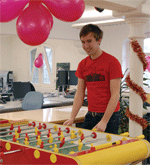 Buro Happold staged a company-wide ‘wear Red for RedR Day’ at the end of February, raising a total of £1,383 for the aid and development charity RedR – the Register of Engineers for Disaster Relief. It is the second time the practice has run a RedR Day since the scheme started three years ago.
Buro Happold staged a company-wide ‘wear Red for RedR Day’ at the end of February, raising a total of £1,383 for the aid and development charity RedR – the Register of Engineers for Disaster Relief. It is the second time the practice has run a RedR Day since the scheme started three years ago.
Throughout the day, the Bath head office held games and contests including a hole-in-one putting competition, a table football tournament, a sweepstake to guess the Oscar winners, a raffle and a cake sale, and raised a total of £644.
Meanwhile, Buro Happold’s London offices, in conjunction with masterplanning, development and urban design consultants EDAW, ran a ‘Wear Red for RedR’ campaign and together raised £700. Most notably, Lilian Relovska, group coordinator for Buro Happold’s Olympic bid group, organised a team event and raised over £200 of this amount, while the other London Buro Happold offices raised almost £500 through raffle ticket and cake sales. The smaller Birmingham office also contributed.
RedR UK helps to rebuild lives by providing aid workers with the skills they need to make a difference. The charity does this through delivering expert international and UK training programmes, running a recruitment service and supporting a membership scheme for professionals vital to relief and rehabilitation programmes around the world.
Buro Happold has long been involved with RedR; current chairman and founder partner of Buro Happold Rod MacDonald was also chairman of RedR for two years, and a trustee of the charity for six years before that. The Happold Trust financially supports the charity, and staff members frequently raise money for RedR individually, through marathons and other sponsored events.
“RedR has a particular expertise in the fields of engineering, security and health, so it’s a natural fit for engineering practices like Buro Happold to support them,” said MacDonald. “Buro Happold has helped raise thousands of pounds to help people blighted by war, natural disaster and famine, and RedR come to us when they need engineers to go to into the field as part of a relief project, or for technical information.”
